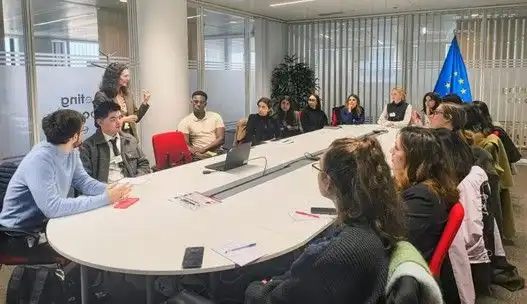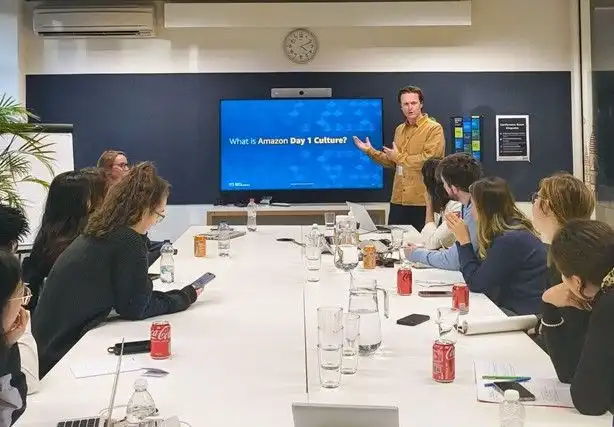Home>Managing in the Age of AI: Lessons from Brussels field trip
10.12.2024
Managing in the Age of AI: Lessons from Brussels field trip
As part of its mission to foster the next generation of leaders in technology and international affairs, the PSIA Tech and Global Affairs Innovation Hub supported a learning expedition which took PSIA students to Brussels to meet practitioners working at the intersection between digital technologies and public policy.
The students of the Digital Transformation and Innovation Management and adjunct faculty members Leonardo Quattrucci and Tommaso Balbo di Vindadio tell us about this very special day of November 2024.
The advancement of Artificial Intelligence (AI) systems, such as the emergence of generative AIs, is poised to deeply modify our society. As Pr. Ethan Mollick wrote in his book Co-Intelligence: Living and Working with AI, “today’s AI may be the worst we will ever use”. And yet, it is already forcing a transformation across sectors and organizations:
- How should organizations adopt AI, balancing innovation and precaution?
- How can we govern this exponential technology?
- What does management look like in the Age of AI, when machines are faster and more creative than humans on many accounts?
To offer students practical insights on these questions, the Technology and Global Affairs Innovation Hub of Sciences Po's Paris School of International Affairs supported a field trip to a European capital where the debate on AI adoption and governance is glowing hot: Brussels. The elaboration, negotiation, then adoption in June 2024 of the world’s first AI regulation ignited a global conversation over AI governance, but also, when it comes to public sector transformation, which model is right to reap productivity growth without compromising trustworthiness and safety.
To explore different perspectives on these complex but fascinating questions, our students of Digital Transformation and Innovation Management, a course taught by Leonardo Quattrucci and Tommaso Balbo di Vindadio, took the train to Brussels to meet with key public and private players in the AI game: Amazon Web Services, the European Commission, and Microsoft.
Comparing culture across public and private organizations
With new technologies evolving at an accelerating pace, public and private organizations are increasingly incited to adopt a culture of innovation.
Microsoft staff members exposed to students a culture built around the principles of effort, learning, and persistence to “pursue its mission of empowering every individual on Earth through technology”. Technical and organizational challenges such as making AI innovation trustworthy are embraced as opportunities in a growth mindset.
We found comparable traits, under different labels, at other organizations, including public ones. The European Commission recently passed an Interoperable Europe Act, a radical new regulation that pushes European governments towards building shared digital public infrastructures to focus on open innovation and foster digital commons shared across Member States rather than re-inventing the wheel for every digital transformation project.
The visit to Amazon offices gave students another ringtone. According to the official company culture as presented by its employees “every invention works backwards based on customers' needs”, with a focus on approaching the design of digital solutions on behalf of “wonderfully dissatisfied customers”, as formulated by founder and former CEO Bezos, a core part of the company’s famous “Day 1” mindset, which instructs employees to still act with a startup mindset, despite the company's size.
Exponential Technologies Call for New Governance Models
Like software, governance in the AI age cannot be seen as a finite project; it must become an evolving product, which leads to a shortening of the policy cycle. When it comes to the impact of “Deep Tech revolution” on statecraft, the public sector must engage in both the governance of emerging technologies and the transformation of its own institutions with the same technologies. That was the consensus across the stakeholders we visited.
Institutions are expanding their functions to keep up with changing times. As highlighted by the United Nations Development Program (UNDP), Digital Public Infrastructure is now recognized as the highway of the future that accelerates innovation, facilitates sustainable development and ensures access to public services to citizens across the continent. For instance, the EU is pushing for public technical stacks whose development and use are shared by several Member States with the establishment of European Digital Infrastructure Consortia (EDIC).
Public decision makers working on governance are also looking to modernise their procurement processes, while creating training resources and setting up frameworks to better identify and deploy pertinent use cases. However, their role is also to ensure that the speed of innovation (public and private) does not compromise the trustworthiness of technologies released to the public.
From our conversations we observed how the relationship between the public and tech sectors has changed, evolving from a mostly adversarial model to a dialectical relationship where they can contribute to the transfer of technological and management expertise, as well as the identification of shared outcomes.
Beyond the legal requirements imposed by EU legislation such as GDPR, DSA-DMA, CSRD, or the AI Act, the influence of the European Commission's language on the discourse of Big Tech companies is rising as they tend to integrate concepts such as “co-ownership” and “shared responsibility” in their roadmaps, acknowledging that the public must be embedded in developing products and services whose societal impacts must be taken into account alongside revenue prospects.
Pathways to “Co-Intelligence”: working towards safe AI adoption
To quote Pr. Ethan Mollik again, AI is already a “weird colleague” in the daily lives of tech leaders. It already has the potential to become a resource for public servants around Europe, enhancing access to qualitative public services in a context of budget tightening. During the visits, we saw live demonstrations of how AI can augment not just the productivity but also the creativity of today’s knowledge workers: from sorting and drafting emails to becoming the peer-reviewers of presentations, drafts, and pitches…
The role of technology in explaining the difference in the competitiveness between states is a focal point of the latest Draghi report. Recent research from OECD suggests that firms that adopt AI early are more productive than others, especially when they reap the benefits from high ICT skills in the workforce and high-speed digital infrastructures, two major goals of European policy over the last two decades. Yet, co-intelligence does not mean delegating control to AI; the adoption of AI technology is an opportunity to build better management processes with AI.
In fact, the adage of “trust but verify” becomes even more important when one click can have dire consequences on privacy, safety, security, access to public services and rights. Current research underlines the critical role of keeping a human in the loop. At the same time, public consultations, such as the one recently published by the AI and Society Institute (ENS-PSL), CNNum, The Future Society, Make.org, and Sciences Po’s Tech & Global Affairs Innovation Hub, clearly reflect the citizens' call for accountability, trustworthiness, and fairness in the progressive deployment of AI and algorithmic governance systems.
Data literacy, privacy and safety, and responsible AI management will be critical, both at individual and institutional levels, to avoid mistakes of the past and safely harness the potential of AI, in the EU and beyond. Training our students accordingly is crucial both to their careers and to successfully tackle this double challenge: governing AI and using it to transform public institutions.



